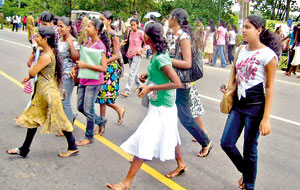“Those eligible for University admission and failing to attend leadership training under the military, which is compulsory, will not be accepted into the universities,” Secretary- Ministry of Higher Education, Sunil Jayantha Nawaratne said.
Leadership training at the army camps will be held for three weeks starting May 23, after which, courses in English and IT and soft skills will be conducted District basis for three months. “We chose army camps because that was the only option left for us to accommodate 21,000 students in one go,” he said, explaining that schools and other selected centres will be used for the three-month courses, after school.
 |
| Ruhuna University students making their way to lectures. (File pic) |
He emphasised the fact that it will not be military training, but military assistance will be utilised for physical education activities. “Then the students will be given a laptop and a dongle and the three-month course will be conducted using technology and resources,” he elaborated.
However, Universities conduct separate orientation programmes for first-year students, before starting their academic courses. The government has selected a new set of teachers to carry out the new programme for first-year students.
“This will be a step towards changing universities to ensure that graduates have the necessary requirements to meet the present job market. University education must not be outdated and that’s the reason for the emphasis on English and IT education,” he added.
He explained that graduates focus mainly on government jobs and not the private sector, as they don’t measure up. “The government recruited 40,000 graduates recently and is spending more then Rs 600 million per month as salaries,” elaborating that this amount will only multiply and continue for the next 50 years, even after they retire.
However, Minister of Higher Education S.B. Dissanayake said that military assistance will be utilised for daily activities, such as waking up early in the morning and attending to daily chores with discipline.
Senior Lecturer- Colombo University and Head of the Federation of University Teachers Association, Dr. Nirmal Ranjith Dewasiri, contradicting, said that the military has a different approach to such activities, which could not be considered appropriate for civil academic institutions.
Convenor- Inter University Students’ Federation, Sanjeewa Bandara, commenting along the same lines, said that, if what the students lack is English and IT knowledge, the Ministry can allocate more teachers to the English Language Teaching Units within the Universities and make University IT labs better equipped, as some don’t have sufficient computers.
Commenting on seeking military assistance, he said that soldiers, after going through their disciplinary and leadership trainings, who have served in the army for years, desert it to become murderers, rapists and robbers. “So, we think using military camps could put additional pressure on students, and hence using military assistance is not appropriate,” he said.
“Parents should think twice before sending their children to be trained in military camps,” he said, adding that these attempts will not be strong enough to challenge the sub-culture found within the universities. |


